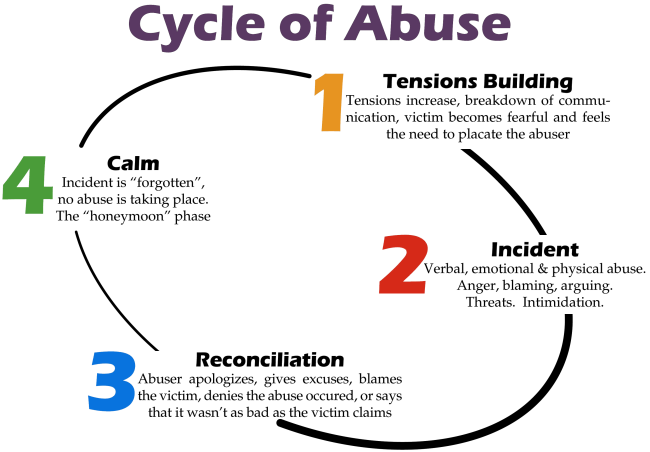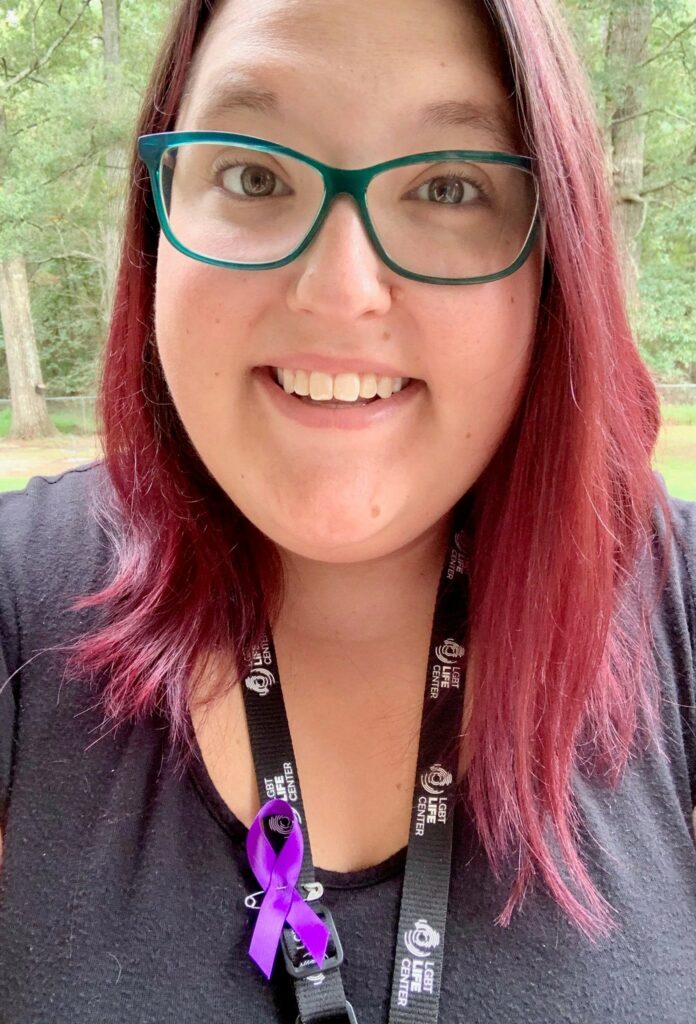Intimate Partner Violence (IPV) affects LGBTQ people at the same rate it affects heterosexual couples, yet many in our community are unaware of what IPV looks like.
In honor of Intimate Partner Violence Awareness Month, we sat down with our crisis counselor Rebecca Rose for a conversation about how she got into the field and what victims can do to identify IPV, make a plan, and be as safe as possible.
Q: What led you to working with domestic violence victims?
When I was younger, I was involved in a traumatic domestic violence incident. At the time, I didn’t know what domestic violence really was. I took the time after that to educate myself more and more on the dynamics of abuse and realized how many warning signs were missed and how most systems aren’t very victim friendly.
It became my passion to raise awareness about domestic violence and to help victims learn and navigate this very difficult process.
Q: Relationships often don’t start out as intimate partner violence, it builds over time. What are some of the “yellow” flags you can look out for?
You are absolutely right. Most intimate partner violence relationships start off as what others may see as “perfect.” Most abusers know how to charm people, they have charisma, they know how and when to turn the controlling and abuse behaviors “on” and “off.”
I would say some “yellow” flags would be:
if your partner begins to act differently (in a negative way) when it is just you and them
when your partner begins to have a lot of input on who you’re talking to
when your partner always wants to look in your phone or not trust you when they don’t have a reason not to
Additionally, it is important that in a healthy relationship boundaries are set. If you try to set boundaries with your partner and they immediately don’t agree to any of them or dismiss them, which is a “yellow” flag and shows that they are not willing to compromise but they would rather control the situation.
Q: What is the cycle of abuse?
The cycle of abuse is what keeps victims trapped within these relationships and what also keeps victims coming back to these relationships. As we previously mentioned, most intimate partner violence relationships don’t start off abusive and controlling. Later in the relationship, there will be a tension-building phase. This is when things may start to get a little uncomfortable. Your partner may start calling you names, criticizing you, threatening you, and/or using angry gestures towards you.
Next is when the incident may happen. Your partner may physically hurt you, they may intimidate you, threaten to harm or kill you or someone you love, they may force you to do something you’re not comfortable with, etc. The incident phase is whenever an episode of emotional, verbal, physical, or sexual abuse occurs.
Third, we have the honeymoon/reconciliation phase. This phase is when your partner apologizes for what they did and makes promises that they will never do it again. In the honeymoon phase, your partner may even buy you gifts or take you out, begging for your forgiveness.
Finally, things are calm and back to normal; until the tension building phase re-surfaces and the cycle begins again.

This cycle is fueled by three things: love, hope and fear.
You love your partner and you don’t want to leave them. You hope that your partner is telling the truth when they apologize and say they will never do it again. You hope that things will go back to the way they were at the beginning of the relationship.
And lastly, fear – you are fearful of your partner. You are fearful that if you leave they may hurt you or themselves. You are fearful that if you don’t keep going along in the relationship like everything is okay that the abuse may get worse.
Q: What can intimate partner violence do to you as a person – what are the mental health aspects?
Intimate Partner Violence can have many effects on a victim. A victim’s self-esteem takes a huge hit when they are in an abusive relationship. As we know, a lot of people that identify as part of the LGBTQ community may already be experiencing low or struggling self-esteem issues. When someone is in an intimate partner violence situation they are usually being criticized and called names on a regular basis. Abusers try to make victims feel like no one else will love them and that they don’t deserve love. A victim may also lose trust in those closest to them because they may become isolated from those people or the abuser may gaslight the victim into thinking that those people don’t care about them.
A victim may have physical symptoms such as exhaustion, always tense (which can affect muscles and other body functions), they may have bruises, etc. If a victim is strangled or choked this can affect their brain function because during that period of time their brain is not getting oxygen and if this happens multiple times it can have long-term effects on the victim’s brain function. There are so many different effects that an intimate partner can have on a victim both mentally and physically and some effects can manifest in both ways.
Q: What are some things that survivors struggle with and where can they seek help?
Survivors struggle with reaching out for help. A lot of times they may not know who they can trust or they have been manipulated to believe that no one will believe them or take them seriously. Survivors struggle with connecting to other people and building new relationships. Survivors struggle with trusting themselves enough to get back on their feet and learning how to sustain on their own again because their autonomy and independence was taken away from them.
Survivors can seek help here at the LGBT Life Center where we can provide crisis intervention, safety planning, and other supportive services to help not only get out of the situation but begin to heal and move on.
Survivors can also seek help with the domestic violence shelters within the area. I also encourage survivors to seek mental health counseling so that they can process the trauma they have experienced and begin to learn coping skills to be able to get back to that independence and trusting others again. Also, each police department in the Hampton Roads area has a LGBT Liaison that can assist if the victim is in immediate danger or needing legal assistance as well.

Rebecca Rose is a Crisis Counselor at the LGBT Life Center who works with victims of Intimate Partner Violence to provide advocacy and support services. Intimate Partner Violence Awareness is something she is very passionate about and holds near and dear to her heart. Rebecca has I worked with victims of crime and violence over the past four years in different capacities such as victim-witness advocate, domestic violence shelter advocate, and Child Protective Services worker. Her passion is to help speak up for those whose voices have been silenced or dismissed.
You can reach Rebecca at rrose@lgbtlifecenter.org or by calling 757-640-0929.
Connect with us!
Twitter.com/LGBTLifeCenter
Facebook.com/LGBTLifeCenter
Instagram.com/LGBTLifeCenter
Sign up for our monthly newsletter by clicking here.
Leave a Reply